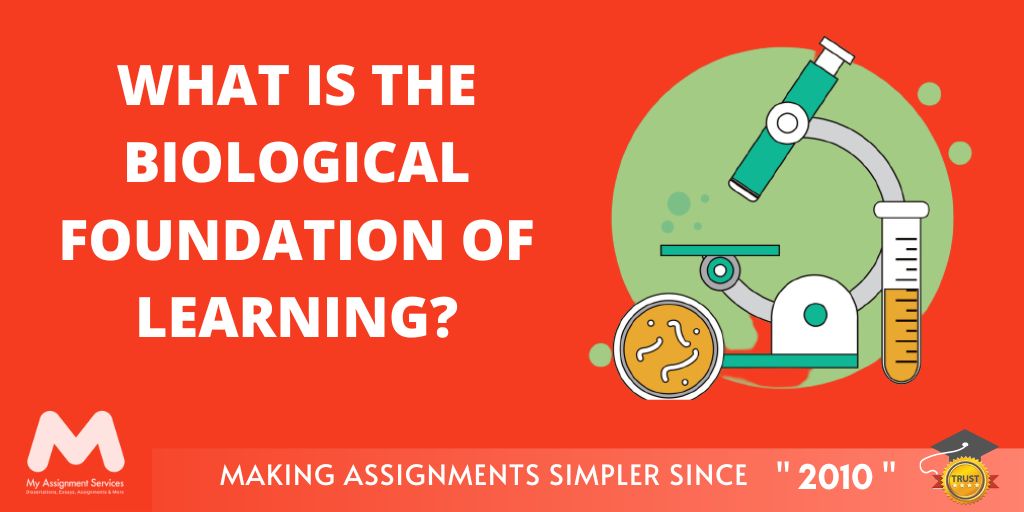
Learning is the fundamental aspect of every living organism, and the same is true for us humans, as stated in the unit BFD105 - Biological Foundations. We nurture self-improvement, learn skills, and foster development and growth in our communities. Our experiences trigger changes in our physical and psychological state, changes that last for a long time or even a lifetime.
We are biologically designed to learn and evolve. The evolutionary modifications in our traits occur due to our interactions with the environment. A study published by The Psychology Journal showed that attaining knowledge is a diverse discipline. Learning is an ongoing process that is the result of our stimulus-response.
Did you know that teaching someone what you learned is an effective way of remembering it in the long run? It is indeed a psychological technique called the Feynman Technique.
Adaptation is a crucial part of human life spread across all development stages. The concept of learning is still under development in the scientific community. Still, our biological and psychological factors affect the learning process the most. In this blog, we’ll discuss the same further. Tag along to know more.
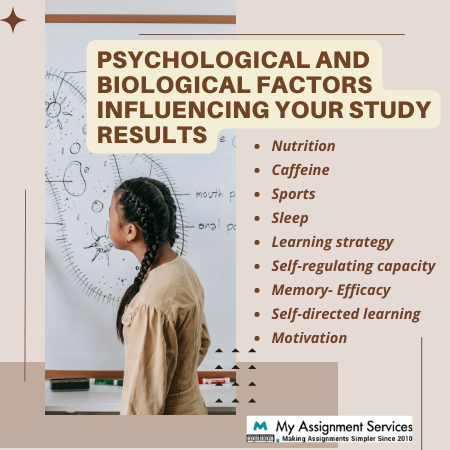
What are the Biological Foundations of Humans?
"Human Beings are animals." You must've heard this statement countless times. No matter how bizarre it sounds, our primitive nature is similar to animals in more aspects than one. We are the product of millions of years of evolution that gave us an adaptable edge over other species. The human biological foundation is based on three major behavioral and evolutionary factors:
Self-Preservation
The fundamental instinctive behavior of every species on the Planet is to self-preserve. It means keeping oneself alive - physically or psychologically. The psychological aspects involved are economic, social, and mental security that everyone thrives for in today’s world. After surviving, the next primitive instinct is multiplying. Furthermore, you can seek an in-depth understanding of such concepts in the unit BFD105-Biological Foundations.
The reason for self-preservation
After surviving, the next step for ensuring survival is multiplying. The primary reason for self-preservation is to reproduce. We, humans, are no different from animals in this. To become a species that survives long, there must be a reason for striving to survive. The survival of the fittest does not only entail beating others to be the last one standing.
But, it means to become a species that interacted with its surroundings and evolved the most. We have to adapt, change and evolve to survive and these are our reasons for self-preservation.
A study published by the Review of General Psychology showed that playing violent survival games helps children get over their fears and develops instinctive decision-making.
Method to enhance self-preservation
All organisms respond to stimuli - hunger, thirst, fear, exhaustion, asphyxiation, etc. - as an automatic response. Humans can adapt to more than one environment, grow food, build shelters and develop medications; these traits enhance our survival rates. We’ve successfully increased life expectancy and improved our quality of life.
However, we live in a complex society. Satisfying hunger is more than just finding meals; the shelter has changed from finding caves to lavish homes. Even avoiding danger has become difficult due to technological enhancements.
Nursing students must submit various research papers, case studies, lab reflections, essays, and other assignments. So many writing and reading assignments can get overwhelming; if you seek nursing assignment help, you may fill out the enrolment form. Get live guided sessions and free academic resources for your assignments.
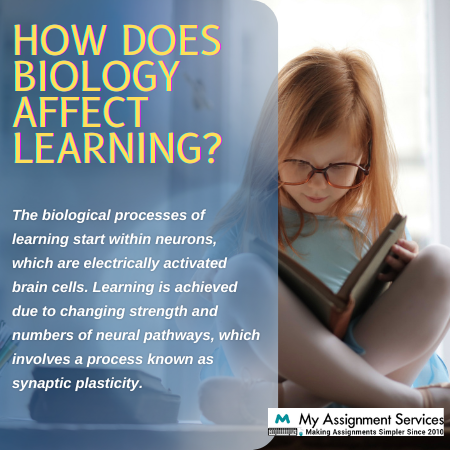
What is the role of Biology in learning?
Neurons are brain cells that are stimulated by electricity, and it is where the learning process begins biologically; they are the biological foundations of psychology and learning. Neuroplasticity involves enhancing the intensity and number of brain circuits to attain knowledge. Synaptic plasticity can be demonstrated by increasing the strength of neuronal circuits.
The transmission rate of electrical signals/stimuli among the cells enhances while practicing an activity frequently. An example, synaptic plasticity elevates while executing a motor skill continuously for some time - learning a physical activity like sports/dance or solving a maths question multiple times. Repetition in activity supports memory formation and behavioral learning.
The concept of the biological basis of learning aids researchers in developing effective teaching techniques to enhance learning. Generally, teachers use a teaching technique that involves students thinking of different approaches to a question, collaborating with one another, and discussing their findings.
Such teaching methods are effective as they involve interaction with a knowledge source that highlights synaptic plasticity, improving the neurotransmitters’ population - chemicals that support cell communication, namely acetylcholine and dopamine. This is the core concept in BFD105-Biological Foundations.
We also learn to spot patterns and make connections - concepts and classes - that strengthen cognition. It helps us remember things for longer periods. Moreover, our learning is greatly affected by our psychology. Studies show that pressure to succeed reduces the ability to learn and develop skills.
Research conducted by Stanford University in 2014 proves that multitasking hinders your psychological development. It increases the chances of error by 50% and adds to the time taken to complete a task.
A textbook example of such practice is seen in many classrooms. A student who crammed all night for a test loses the knowledge within hours or days after the test. On the other hand, a student with lower negative stress will potentially retain their memory of the material for longer periods or maybe even lifelong.

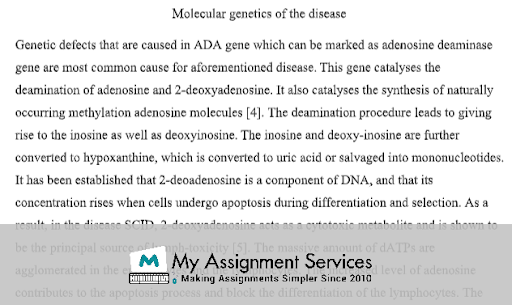
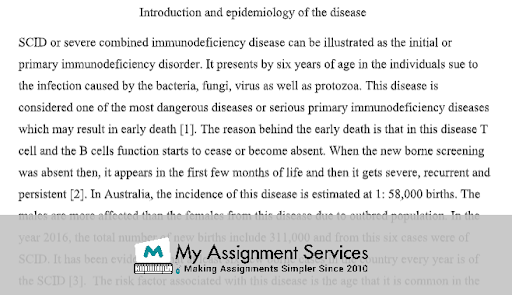
How can we define the Biological Foundations of Psychology?
The learning process is influenced by psychological factors as well. An example of this is motivation as an internal factor that drives students to learn and rules their behavior towards attaining knowledge. Intrinsic motivation forms comprise primary activities that ensure feeling pleasure, attentiveness, and satisfaction.
Whereas extrinsic motivation forms stem from tangible outcomes like obligations, benefits, or rewards. With such types of motivations incorporated in the learning process, add human’s external/internal desires that we constantly strive to fulfil through lifelong learning - academic or instinctive.
Additional factors that influence learning are other sources of stress and the stress rates experienced by different individuals. Learning in a stressful environment elevates cortisol levels immediately. Cortisol is a hormone released due to stress that negatively affects the learning process and our ability to memorize.
Recess plays a big role in children’s learning behavior as they can focus better after some physical activity when compared to long hours of sitting at a place and studying. Proven by David F and Anthony D Pellegrini in their study of the relationship between learning and physical activity.
Therefore, we can conclude that information comprehension is affected by external psychological factors. Studying in a quiet, tranquil, and strained setting is beneficial not only in terms of knowledge but also in terms of production outcomes. Get more insight from the unit BFD105-Biological Foundations.
Nursing students struggle with completing their assignments. There can be many reasons, like a lack of time or reference materials, inadequate knowledge of the subject, and formatting difficulties. If you're going through the same, you can get free resources and affordable assignment assistance from professionals in the healthcare sector. Fill out the enrolment form to get nursing assignment help today.
Related Study Materials
Our Experts can answer your Assignment questions instantly.
Ask Question0 Comment
Get It Done! Today
1,212,718Orders
4.9/5Rating
5,063Experts













Loved reading this Blog? Share your valuable thoughts in the comment section.
Add comment